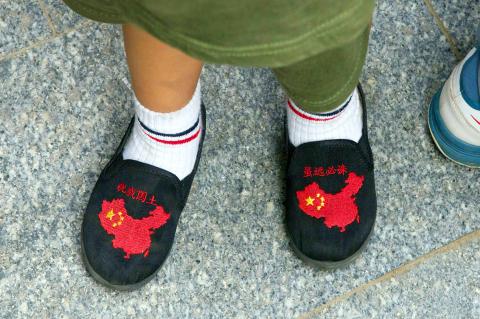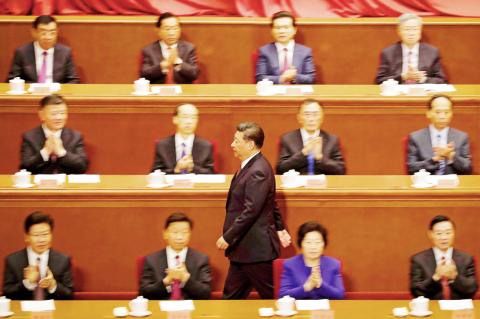Chinese President Xi Jinping (習近平) yesterday issued a tough line on national sovereignty amid multiple territorial disputes with its neighbors, saying China will never permit the loss of “any piece” of its land to outsiders.
Xi’s declaration came during a nearly one-hour speech in Beijing marking the 90th anniversary of the founding of the People’s Liberation Army (PLA), which has formed a key pillar of support for the Chinese Communist Party (CCP) since 1927 and is the world’s largest standing military, with 2.3 million members.
“The Chinese people treasure peace and we absolutely do not engage in invasion and expansion. However, we have the confidence to conquer all forms of invasion,” Xi told government leaders and current and retired PLA members gathered at the Great Hall of the People.

Photo: AP
“We absolutely will not permit any person, any organization, any political party — at any time, in any form — to separate any piece of Chinese territory from China,” Xi said to applause. “No one should expect us to swallow the bitter fruit of damage to our sovereignty, security and development interests.”
Xi made no reference to any specific conflicts or disputes during his address, which focused largely on the PLA’s growth from a scrappy guerrilla force fighting Chiang Kai-shek’s (蔣介石) Chinese Nationalist Party (KMT) and Japanese invaders into one of the world’s most powerful, if largely untested, militaries.
Xi also emphasized that the military’s highest loyalty is to the CCP, underscoring the PLA’s key role as regime preserver through crises such as the bloody suppression of 1989 pro-democracy protests at Tiananmen Square.

Photo: AFP
Top Chinese leaders have consistently rejected calls to make the PLA loyal to the government and people instead.
“The people’s army will resolutely safeguard the leadership of the Chinese Communist Party and our country’s socialist system, resolutely safeguard national sovereignty, security and development interests, and resolutely safeguard regional and world peace,” Xi said.
The speech followed a parade on Sunday at a training ground on the edge of the Gobi Desert in Inner Mongolia during which Xi donned fatigues and declared that the military has the “confidence and capability” to ensure China’s sovereignty, security and national interests.
Xi, who commands the PLA as chairman of the Central Military Commission, has frequently spoken of his “China Dream” to restore China to a leadership position in international affairs with a modern, far-reaching military force to match.
In related news, China yesterday formally opened its first overseas military base with a flag-raising ceremony in Djibouti in the Horn of Africa.
China began construction of a logistics base in Djibouti last year. It will be used to resupply navy ships taking part in peacekeeping and humanitarian missions off the coasts of Yemen and Somalia, in particular. It is China’s first overseas naval base, though Beijing officially describes it as a logistics facility.
State radio said more than 300 people attended the ceremony, including deputy Chinese naval commander Tian Zhong (田中) and Djibouti’s defense minister.
Djibouti is at the southern entrance to the Red Sea on the route to the Suez Canal. It already hosts US, Japanese and French bases.
Additional reporting by Reuters

SECURITY: As China is ‘reshaping’ Hong Kong’s population, Taiwan must raise the eligibility threshold for applications from Hong Kongers, Chiu Chui-cheng said When Hong Kong and Macau citizens apply for residency in Taiwan, it would be under a new category that includes a “national security observation period,” Mainland Affairs Council (MAC) Minister Chiu Chui-cheng (邱垂正) said yesterday. President William Lai (賴清德) on March 13 announced 17 strategies to counter China’s aggression toward Taiwan, including incorporating national security considerations into the review process for residency applications from Hong Kong and Macau citizens. The situation in Hong Kong is constantly changing, Chiu said to media yesterday on the sidelines of the Taipei Technology Run hosted by the Taipei Neihu Technology Park Development Association. With

CARROT AND STICK: While unrelenting in its military threats, China attracted nearly 40,000 Taiwanese to over 400 business events last year Nearly 40,000 Taiwanese last year joined industry events in China, such as conferences and trade fairs, supported by the Chinese government, a study showed yesterday, as Beijing ramps up a charm offensive toward Taipei alongside military pressure. China has long taken a carrot-and-stick approach to Taiwan, threatening it with the prospect of military action while reaching out to those it believes are amenable to Beijing’s point of view. Taiwanese security officials are wary of what they see as Beijing’s influence campaigns to sway public opinion after Taipei and Beijing gradually resumed travel links halted by the COVID-19 pandemic, but the scale of

A US Marine Corps regiment equipped with Naval Strike Missiles (NSM) is set to participate in the upcoming Balikatan 25 exercise in the Luzon Strait, marking the system’s first-ever deployment in the Philippines. US and Philippine officials have separately confirmed that the Navy Marine Expeditionary Ship Interdiction System (NMESIS) — the mobile launch platform for the Naval Strike Missile — would take part in the joint exercise. The missiles are being deployed to “a strategic first island chain chokepoint” in the waters between Taiwan proper and the Philippines, US-based Naval News reported. “The Luzon Strait and Bashi Channel represent a critical access

Pope Francis is be laid to rest on Saturday after lying in state for three days in St Peter’s Basilica, where the faithful are expected to flock to pay their respects to history’s first Latin American pontiff. The cardinals met yesterday in the Vatican’s synod hall to chart the next steps before a conclave begins to choose Francis’ successor, as condolences poured in from around the world. According to current norms, the conclave must begin between May 5 and 10. The cardinals set the funeral for Saturday at 10am in St Peter’s Square, to be celebrated by the dean of the College